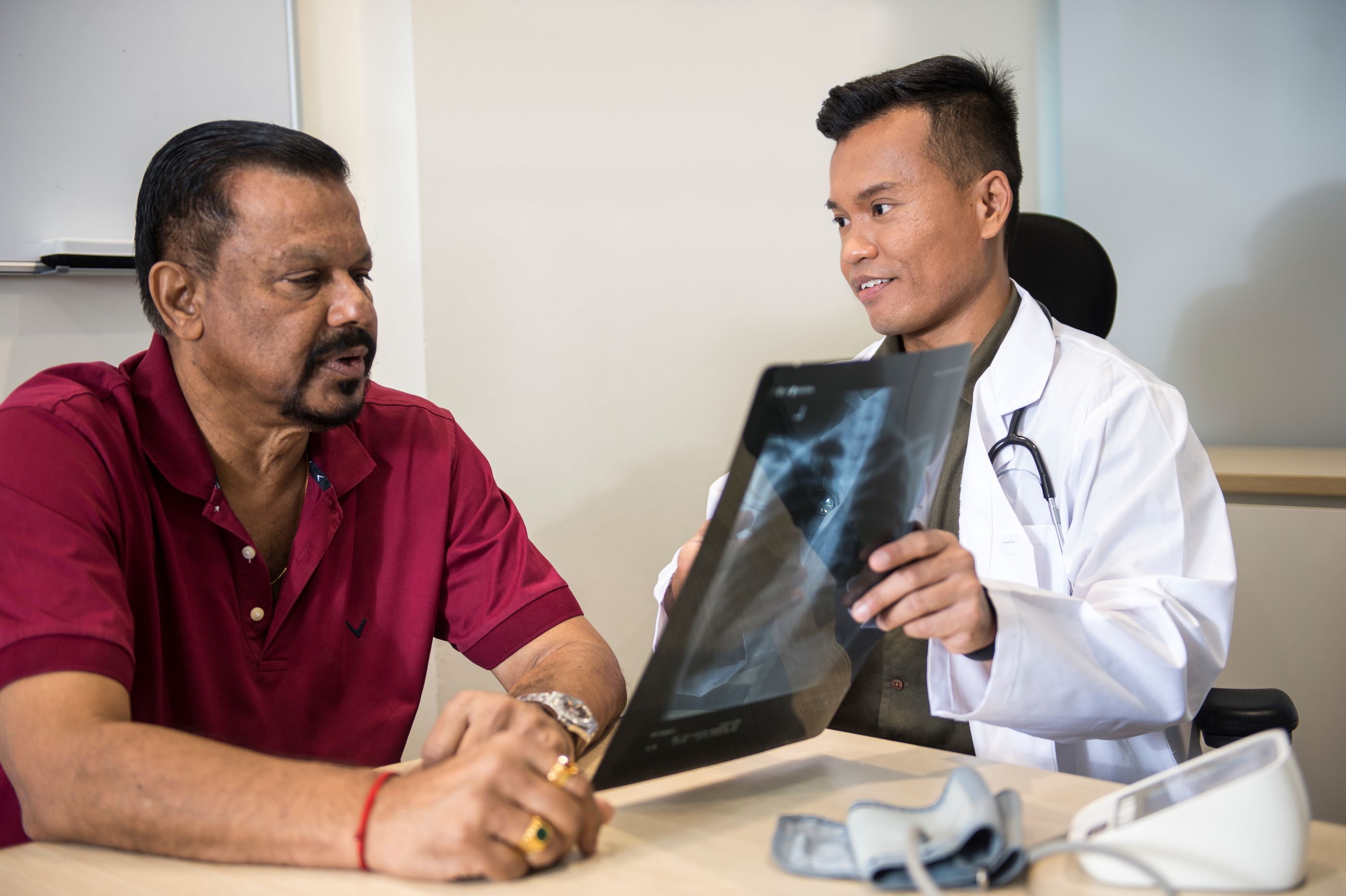5 Dec 2022
SOURCE: CPF Board

Health screening is important for the the maintenance of our body and health. Early detection of underlying health conditions helps to lower the risk of serious complications in the future. It also allows you to manage any medical ailments early with fewer complications.
So, what do you need to know about going for a health screening? Here’s a breakdown.
What does a health screening consist of?
There are basically two types of health screening tests: basic and specific health screening.
Basic health screening aims to capture a person’s overall health condition. No matter which healthcare provider you choose, the basic health screening package should at least cover these four components:
- Medical health assessment: done by a qualified physician to assess your medical history and lifestyle and identifying any potential health risks
Physical examination:
measuring your Blood Pressure (BP)
BMI (Body Mass Index) by taking your height, weight, and waist circumference
checking your vision
Blood glucose test*: your blood sample is taken after fasting, to test for diabetes
Blood cholesterol test: checking for high cholesterol and cardiovascular diseases, taken after fasting.
*Non-fasting blood glucose tests are available under some providers
Specific health screening is done based on the individuals’ health condition/needs to detect specific diseases. These packages typically consist of more medical tests to help the doctor gets a clearer and more complete picture of your specific health condition, based on your risk profile. Some of these additional tests include:
ECG (electrocardiogram): to test if your heart activity is normal and detect any heart condition
Full blood count: to check if you have anaemia
Liver, kidney and thyroid function tests
Chest X-Ray
Urine analysis: to check your kidney function, through a urine sample
If they are not already included, most providers allow you to add these tests (and others) to your overall screening package.
What tests should you do?
General screening tests (beneficial for everyone)
General screening tests for adults:
Recommended for |
To screen for |
Screening test |
Screening frequency |
Individuals aged 18 yrs and above |
Obesity |
Body Mass Index (BMI) |
Once a year |
Hypertension (High blood pressure) |
Blood pressure measurement |
Once every two years or more frequently as advised by your doctor |
|
Individuals aged 40 yrs and above |
Diabetes mellitus |
Fasting blood glucose |
Once every three years or more frequently as advised by your doctor |
Hyperlipidaemia (High blood cholesterol) |
Fasting lipids |
||
Individuals aged 50 yrs and above |
Colorectal cancer |
Faecal Immunochemical Test (to test for blood in stools) |
Once a year |
Colonoscopy |
Once every five to ten years |
||
Additional tests for women |
|||
Women aged 25-69 yrs, who have had sexual intercourse |
Cervical cancer |
Pap test (for 25 to 29 years old) |
Once every three years |
HPV test (for 30 years old and above) |
Once every five years |
||
Women aged 50-69 yrs |
Breast cancer |
Mammogram |
Once every two years |
How often should you go?
The frequency of your health screening depends on many factors, like your age, sex, current health condition and family medical history.
Here are 3 points you should follow as guidelines:
1. Go for regular screening tests at the recommended frequency (i.e., shown in the table above).
2. One-off screenings will only pick up health conditions that are present at the time of screening.
3. Regular screening can help to detect conditions that may develop after the previous screening.
If in doubt, always seek advice from your doctor.
How much does it cost?
Here’s a comparison of health screening packages from private and public medical institutions:
Healthcare provider |
Health screening package |
Cost* |
Public hospitals |
||
Singapore General Hospital |
Basic to Enhanced Chronic Disease Assessment |
$363.80 - $749 |
National University Hospital |
Health Essential to Extensive |
$298 - $998 |
Tan Tock Seng Hospital |
Core to Three-High |
$200 - $530 |
Private clinic |
||
Central Clinic |
Basic to Comprehensive |
$48 - 338 |
Fullerton Health |
Live Fuller Premium to Platinum |
$500.76 - $1,806.16 |
Raffles Medical Group |
Raffles Basic to Executive |
$74.90 - $1,348 |
Private hospitals |
||
Farrer Park Hospital |
HealthTrack Regular to Premier |
$468 - $1,780 |
Mount Alvernia Hospital |
Prime to Exclusive |
$695.50 - $1,444.50 |
Mount Elizabeth Hospital |
Screen Elite to Prestige |
$868 - $6,498 |
Source: From the websites of the various clinics/hospitals
*Cost subject to change
As you can see, the cost health screening package varies across a number of providers in Singapore. It will also get more expensive when there are more tests in the particular package.
By the same token, sometimes more is not always best. While age is considered a big factor in the choice of health screening tests, it’s more important to assess your personal medical condition and risk factors. In this case, it is advisable to consult your doctor to identify the type of tests you should do and thus avoid doing unnecessary tests.
Do polyclinics provide health screening? Polyclinics provide screenings for specific conditions like cholesterol, diabetes and hypertension. This includes cardiovascular risk screenings such as height and weight measurements, blood and blood pressure tests. There are also breast and cervical cancer screenings available. However, such screenings, if needed, will only be ordered by the doctor upon consultation.
Are there any other options available?

Under the Health Promotion Board’s Screen for Life (SFL) programme, Singapore citizens can get subsidised health screenings at Community Health Assist Scheme (CHAS) General Practitioner (GP) Clinics. With the subsidies, you only need to pay no more than $5 per visit. SFL aims to encourage citizens and Permanent Residents (PR)* to go for regular health screening and follow-ups.
Cost |
|||
Pioneer Generation |
Merdeka Generation |
CHAS Card – Blue or Orange |
CHAS Card – Green/Eligible Singapore Citizens |
Free |
$2 |
$2 |
$5 |
* Permanent Residents should check in with their CHAS GP clinic on the screening test rates offered under the Screen for Life programme. The prevailing doctor consultation will be charged accordingly by the respective CHAS GP clinics.
Recommended screening by age (offered under SFL)
18 - 39 |
40s |
50s |
60s |
Cervical cancer -women (who have had sexual intercourse) |
|
|
|
If you are between 18 and 39 years old, and is identified to be at ‘higher risk of’ developing diabetes after taking the Diabetes Risk Assessment (DRA), you are eligible for the SFL subsidy for cardiovascular risk screening (i.e. diabetes, high blood cholesterol and high blood pressure).
Find out more about DRA here.
As a general rule, you should regularly test for chronic illnesses such as high blood pressure, diabetes and high blood cholesterol, along with cancer, regardless of your age.
What's after a health screening?
If the doctor evaluates you as being in the pink of health, congratulations! Maintain your good health by levelling up your physical well-being. But remember, screening once is not enough, you need to screen regularly to pick up conditions early and manage them appropriately.
If there is a health issue detected, schedule a follow-up with your doctor/specialist immediately to identify the next steps. Your MediSave savings can help to offset your medical expenses for several follow-up treatments.
In summary, going for regular health screenings is not something that you should put off. Even as you are feeling healthy right now, as the old saying goes, prevention is better than cure. This also applies in a financial sense, as taking care of problems before they take root will save you more money in the long run. You risk incurring large healthcare expenses on additional medical treatment and medication, especially if you let underlying health problems fester and grow.
If you were initially worried about costs being prohibitive, hopefully this article would have equipped you with the information you need to take advantage of the cost savings from free and subsidised health screenings. Do remember to schedule regular screenings so that you can take care of your physical well-being for the longer term.
Information accurate of as of date of publication.
.jpg)

